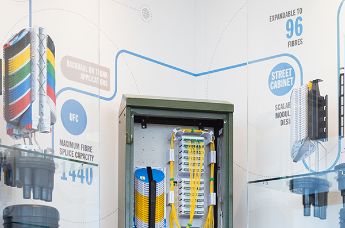
HellermannTyton is an established and innovative global leader in the provision of network infrastructure cabling solutions, offering a broad range of quality, high performance connectivity for both residential and commercial use. HellermannTyton‘s Broadband Systems comprise a unique range of fibre splicing closures for the external and internal plant that you would find in any typical FTTX application.
More customers are demanding maximum flexibility and a modular approach to cable management systems that will fit into existing and future networks. HellermannTyton closures and enclosures have been designed to cater for this requirement to accomodate the wide variety of fibre optic cables that are now available including slotted core, loose tube, compact, ribbon and blown fibre / cable applications.

HellermannTyton‘s Broadband Systems comprise a unique range of fibre splicing closures for the external and internal plant that you would find in any typical FTTX application.
The sealed closures from HellermannTyton protect the fibre management systems from adverse environmental conditions whilst maintaining ready access for effective cable installation. The fibres are housed in space saving modular units that minimise network disruption and have been designed to allow further modules to be added at a later date for increased capacity, ensuring a future proof design.
The closures have been designed to meet customer’s demands for various fibre management systems including single circuit, single element, multiple element and cross connectivity. Tray design is evolving to meet the needs of bend sensitive fibres, for which the Hellipse NZDF range has been developed, for increased fibre storage capacity, the ability to change direction of the fibres and to cater for the various types of splice protectors and PON devices that are now available in the global market.
Many of the sealed closures lend themselves to a PON architecture allowing up to 1440 fibres in the largest UFC closure all the way down to 36 fibres with the FST closure. All of the closures from HellermannTyton offer flexibility and access so that more fibre can be added in the future (up to their maximum capacity). All of the closures are compatible with Cablelok, HellermannTyton‘s 100% mechanical seal, or heatshrink can be used as an alternative sealing method.
The UFC is a high fibre capacity cap ended ready access closure used in underground, direct burial or aerial installations. It is available with Integrated Routing (IR) or tubing fibre management system.
The FDN is a medium to large oval shaped cap ended closure with a range of base options including the 59 Port base which has a high number of small ports for use in underground, direct burial or aerial installations. It is available with Integrated Routing (IR) or tubing fibre management systems.
The CFN is a compact oval shaped cap ended closure with 2 base port options for a wide range of FTTx applications for both P2P and P2MP topologies.
The FML is a medium to large cap ended ready access closure for use in underground, direct burial or aerial installations. It is available with Integrated Routing (IR) or tubing fibre management systems. The mid-range capacity and port flexibility offered by the FML make it suitable for FTTX access and trunk networks.
The FRBU is a compact cap-ended ready access closure for use in underground, direct burial and aerial installations. The mid-range capacity and port flexibility offered by the FRBU make it suitable for FTTK, trunk networks and CATV installation.
The FST is a compact cap-ended ready access closure for use in aerial, underground and directly buried installations. Its small size, port flexibility and value makes the FST popular for splicing low fibre count distribution cables in FTTH, FTTK, trunk and campus networks, CATV and CCTV installation.
The connectorised solution is available in FDN, FRBU and FST closures as standard. Using fibre connectors with fibre pigtails, these pre-configured closures allow for quick customer connection or disconnection. See Closures
HellermannTyton is now able to supply pre-assembled pre-tubed fibre optic closures, greatly reducing installation time, cost and complexity for blown fibre FTTH applications. Contact Sale team for more information
HellermannTyton have designed a range of outlets, distribution boxes, customer connection points and connectorised street cabinets and wall boxes that, combined with the fibre splice closures, provides full end to end FTTX solutions for both new developments and existing buildings.

The connectorised fibre PoC and PoP are flexible fibre management systems, designed to be configured in an extensive range of cabinets. The two standard systems offer either 48 LC Simplex connections (expandable up to 96) in a Stainless Steel cabinet or 96 LC Simplex connections in a Polycarbonate cabinet. Other configurations may be available to meet more exacting requirements - please contact HellermannTyton for further information.

Pole/wall mounted fibre enclosures are essential components of the last mile network, playing a crucial role in distributing connectivity to homes and businesses. These enclosures provide a secure and weatherproof housing for fibre optic cables, splices, and connectors, ensuring reliable and efficient transmission of data signals.

The range of MDU enclosures from HellermannTyton provide high fibre capacity and flexibility within the multi dwelling unit (MDU). The range has been designed in a variety of sizes to service the varying sizes of apartment blocks or office buildings. The S5, the largest enclosure in the range, offers up to 432 fibres or 96 connectorised fibre ports. The S4 offers 240 fibres or 24 connectorised fibre ports. The S3, the middle sized enclosure offers up to 96 fibres or 24 connectorised ports. The S2 XL offers 32 LC connections using 8 LC Quad adaptors. The S2 offers 24 LC Simplex adaptors. The S1 offers 12 connectorised fibre drops. The S1XS, the smallest in the range provides 12 connectorised fibre drops, designed for the smaller residential or building unit.

Mechanical seals are increasingly used by engineers and network owners in fibre installation projects across the globe. The traditional heat-shrink methods are viewed as craft sensitive with too many health and safety issues relating to gas bottle storage / transportation and confined space use.
Other solutions in the marketplace typically rely upon secondary sealing tapes or resins to complete the seal which adds time, complexity and likelihood of error to installations.
Cablelok is a unique and patented 100% mechanical seal which provides the environmental sealing of cable entering a HellermannTyton closure. The sealing is achieved by a number of internal lip seals, which are compressed onto the cable during installation.
With an installation time of only 2-3 minutes, Cablelok provides a 100% seal and is significantly faster and safer than using a heatshrink sealing method. Each port size on the HellermannTyton closures has a dedicated cablelok, each accommodating a range of cable diameters.
HellermannTyton offer a wide selection of fibre optic splice trays which are compatible with the variety of closures and enclosures available. Splice trays from the Hellipse and Integrated Routing (IR) ranges are supplied in packs of 6, this excludes the IR-SC trays, which are supplied in packs of 12. Trays from the Hellapon and Hellamass ranges are supplied in singular units. Multi-Ribbon trays are supplied in a packs of 3.
The following fibre optic splice trays from HellermannTyton accept a range of splice inserts or splitter bridges which can house different numbers and types of splice protectors and optical splitters on the trays; SE-MKI, SE-MKII, Compact SE, 900µm IR, Hellamass Large, Hellapon Small and Medium Style C, Hellipse NZDF SE-B and SE-A.
The table below illustrates which bridge inserts are compatible with which splice trays and also the maximum number of splices each tray can accommodate using that insert. The fibre splice capacities are calculated on a single stack basis unless otherwise stated.
HellermannTyton broadband products can be found in all FTTX applications including Fibre to the Home (FTTH), Fibre to the Kerb (FTTK), Fibre to the Mast (FTTM) and Fibre to the Building (FTTB). Optical distribution within a FTTX network can face a number of competing technologies including Direct Fibre, Shared Fibre, Active Optical Networks (AON’s) and Passive Optical Networks (PON’s).
Direct fibre is possibly the simplest form of optical distribution. In this architecture, each fibre leaving the Point of Presence (PoP) goes to only one customer. This type of network provides the customer with excellent bandwidth as they have their own dedicated fibre.
HellermannTyton manufacture a wide range of fibre closures and enclosures that can be applied across all areas of FTTX applications. Many of the sealed dome closures lend themselves to a PON architecture allowing up to 1440 fibres in the largest UFC closure all the way down to 36 fibres with the FST closure.

A Fibre to the Home infrastructure delivers high bandwidth and reliability as well as having the capacity to support service developments of the future. Read more about our Customer Connection Point here.
Fibre to the Mast enables high capacity and flexible LTE deployment. It can be a cost effective solution to the rural broadband challenge, providing an efficient way of delivering fast internet access to locations with low population density. Read more in our Fibre to the Mast brochure (PDF).
Fibre to the Kerb is a telecommunications system where the fibre runs to a platform or cabinet that serves a number of customers. It is the final leg of the infrastructure running over existing copper that helps an FTTK network cost less to deploy.
Whether it's a Fibre to the Building, Campus or Business Park, or even a hospital or out of town retail complex, users require a robust yet flexible network that can deliver high performance and bandwidth over a common infrastructure. See products for the internal IR Fibre Enclosures here.